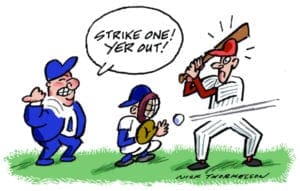The Madness of Zero Tolerance
This article was featured in our weekly newsletter, the Liberator Online. To receive it in your inbox, sign up here.
When news broke this week about 14-year-old Ahmed Mohammed’s arrest for building a clock at home and bringing it to school, I immediately thought of zero tolerance incidents in the recent past. Most specifically, I was reminded of the ridiculousness of the suspension received by my high school class president during our sophomore year.
David was our class president, an honor roll student intent on attending Northwestern University, a member of the marching and symphonic band, a leader in many academic and extracurricular clubs, and an all-around good guy. He was a good guy that had to explain on every college application and in every interview about a 10-day suspension in the 10th grade for bringing a weapon to school.
 Even more innocent than either this incident or this one, David’s suspension was a direct result of zero tolerance policy. David brought a knife to school and got caught with it during lunch. BOOM! Ten day suspension, out of school for an honor student.
Even more innocent than either this incident or this one, David’s suspension was a direct result of zero tolerance policy. David brought a knife to school and got caught with it during lunch. BOOM! Ten day suspension, out of school for an honor student.
You may be asking why such a bright kid needed a knife at school. It wasn’t for protection, because David was immensely popular and friends across the high school cliques. It wasn’t because he was a troublemaker, because David had never received a single disciplinary action in his school career. It wasn’t because he was defiant of the rule, because he was a model student.
He brought the knife to school to eat an apple, because David wore braces, and he had to cut away the skin of the apple to prevent it from getting stuck in very expensive orthodontics.
While I can appreciate the absolute right and wrong nature of zero tolerance policies, they leave absolutely no room for discretion or appeal to common sense for thinking individuals to realize the difference between intent and outcome. When applied in a school setting, I’m curious to know why zero tolerance policies exist, as the trust to make responsible decisions teachers and administrators disappears.
Aren’t they still trusted to make educational decisions for their students?
If we can’t trust that they can make the decision about right and wrong about a weapon or drugs on campus, how can we trust them to make the right decisions for the students they teach?
By the way, I’m happy to share that David went on to attend Morehouse College in Atlanta and chose Yale for his graduate studies.
